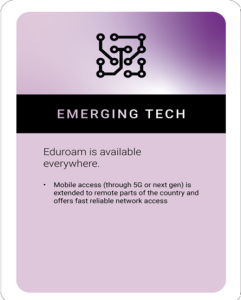
This is an example of a workshop we have been developing around imagined futures for universities and colleges. It is based around a set of challenge cards that are used to pose examples of things that could happen in the next 10-15 years. The purpose is to help participants imagine what the impact could be on a course, an assessment model or a whole institution. Participants are asked to first consider the implications and then how they might plan for that future.
Background
We looked at several new and emerging institutions that are responding to changes in the sector. For example some are more focussed on employability such as the Multiverse Apprenticeships or the Dyson Institute; offering alternatives to an international student market such as Minerva University or Nexford University. There are also technology focussed institutions such as the Space Park Leicester or Staffordshire University London Digital Institute. Universities and Colleges are diversifying, and new institutions are emerging to meet new increasing demands for international students, technology-based courses and CPD from mature students.
There are many drivers for change including an international and UK wide growth in student numbers, political and social changes, an increasing focus on employability skills and (of particular interest to us at Jisc) the emergence of new technologies such as Generative AI (GAI), edge computing, and immersive learning.
We have developed a set of resources and designed workshops to help explore these change scenarios so institutions and Jisc can start to plan for the future.
Workshop example
We have been running some pilot workshops over the summer, asking people to imagine what a future institution might look like in 2035. They have done this in response to a set of scenarios or challenges. We have around 90 challenge cards. Below is a selection we gave to a group in the workshop.
The workshop we piloted runs like this:
Each group receives an example institution or describes their current institutional model. They consider the focus of resources around teaching vs research, international vs home students, links with employers etc.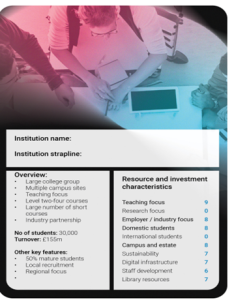
We then get them think about the experience of staff and students at the institution. In this case as it was an imaginary institution, we asked them to give it a name write a strapline that describes the purpose of the institution.
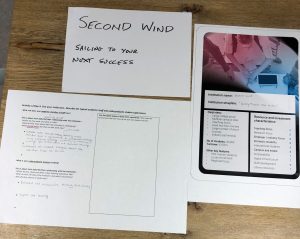
The groups then pick ~ 6 challenges cards and consider how this might impact on their institution, what opportunities it might offer and how they could adapt or diversify to meet the challenge. They record the outputs as below.
The next activity asks them to reimagine their institution and describe what it will look like in 2035. They are also asked to reflect on what this would mean for their institution and what changes might be required.

The outputs can then be used to create an imagined future institutional model. They don’t need to be viable, or even realistic. The process is to get people to explore what might be possible and think about what changes they might want to make in their own institution.
Example workshop output: Second Wind
In 2023 this large college group Second Wind, ‘Sailing to your next destination’, is already looking at the growth in mature students in the market. They have recognised the potential of peer learning and have strong links with local businesses. They are looking to tap into the growing lifelong market.
By 2035 the college group has transformed in response to challenges around the disruption of global warming on their existing campus, an increase in the number mature students and an aging student population and DfE introducing new diversity targets for college.
Name: Second Wind – Growing together
Strapline: Cultivating your definition of success
Key features:
- Knowledge and practical skills sharing.
- Learning circles – learning in the environment.
- Learning guides – saying goodbye to tradition teacher/student hierarchies.
- Purpose led learning.
- An education you can access for life.
A new mega college
A new mega college group has emerged in 2035 in response to new diversity targets and students demands around social justice, learning and employment expectations. The college group has also developed in response to increasing demands for knowledge and skills around technology and the environment. There has also been a large increase in students demands, in particular from mature students.
A partnership approach with students drives excellence and success of the college group. New tools support peer learning; AI curriculum creation tools can provide self-supported and generated learning resources for guides and learners; and collaborative group activities can be generated automatically and peer assessed.
Mature students learn alongside 16-21 year olds, sharing expertise, knowledge and skills. The younger cohort increases the adoption of new technologies for mature learners, whilst mature students with decades of work experience provide support and mentorship both in the college and the workplace. These new “learning circles” allow more education to happen in the workplace providing apprenticeships for younger learners and CPD for more mature students.
Existing campuses being damaged by extreme weather conditions and proving unsuitable in hotter weather created an opportunity to re-think the campus. Rather than building new they moved more learning into the workplace and expanded into international markets. This also led to a re-think of the learning environment both physical and online – cloud services and edge computing become the norm, with the end of on premise/local server rooms. The students were able to not only feed into the design of this new environment but also participate in its creation of part of the curriculum.
Get involved
We are planning to run some workshops over the next few months either with individual institutions or at events to help explore future needs and challenges. If you would be interested in attending a workshop or finding out more then please email innovation@jisc.ac.uk.


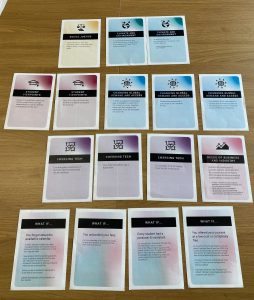
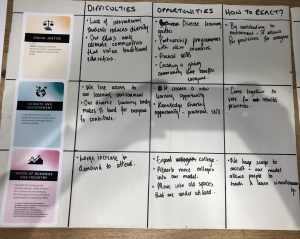
2 replies on “A workshop to explore future challenges”
[…] workshop exploring the future challenges of higher and further education has been extensively piloted and is ready for launch. We are running 45-minute sessions, in person, […]
[…] 2035 workshop we delivered in June 2022 and use some of the learning and resources from the Imagined Future workshops we are running this year. The event provided us with an opportunity to build some future scenarios […]